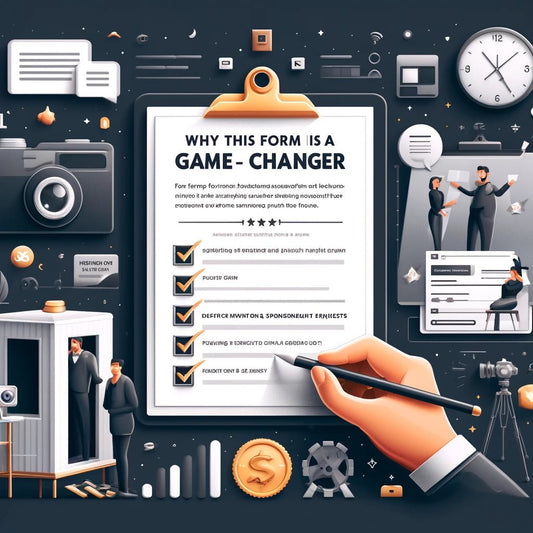
Maximize Brand Exposure with Corporate Event Sponsorship Opportunities
Share
.jpg)
Corporate event sponsorship plays a significant role in the business world, allowing companies to support and associate themselves with specific events for various purposes. Corporate event sponsorship can be defined as the financial or in-kind support provided by companies to events in exchange for promotional opportunities and brand exposure.
Companies engage in corporate event sponsorship for several reasons. Firstly, it offers a platform to enhance brand visibility and reach a wider audience. it allows companies to showcase their products, services, or values to a targeted audience, boosting brand awareness and reputation. Furthermore, corporate event sponsorship enables companies to establish and strengthen relationships with key stakeholders, including customers, partners, and the local community.
There are different types of corporate event sponsorship, including financial sponsorship, where companies provide monetary support, and in-kind sponsorship, where companies offer goods or services instead. Each type offers unique benefits and promotional opportunities for companies, depending on their resources and objectives.
When identifying the right corporate event for sponsorship, companies consider various factors. These include aligning the target audience of the event with the company's target market, ensuring a fit between the event's theme and the company's brand and values, and evaluating the cost and budget considerations to determine feasibility.
To approach corporate event sponsorship effectively, companies need to follow a strategic process. This includes planning and strategizing to identify suitable events, creating a sponsorship proposal, and negotiating terms and benefits with event organizers. Once sponsorship is secured, companies must execute and activate their sponsorship to maximize exposure and engagement with the event audience.
Measuring the success and return on investment (ROI) in corporate event sponsorship is crucial to evaluate its effectiveness. Companies establish key metrics for measuring success, such as increased brand awareness, customer engagement, or lead generation. Calculating ROI involves determining the financial gains against the investment made in the sponsorship, including both monetary and non-monetary benefits. By analyzing these metrics, companies can assess the impact and value of their corporate event sponsorship.
What is Corporate Event Sponsorship?
Corporate event sponsorship, a dynamic practice in the business world, is all about partnering with companies and supporting their events. In this section, we'll uncover the essence of corporate event sponsorship and what it entails. Prepare to dive into the definition and intricacies of this collaborative endeavor, where businesses align their brands and resources with events to achieve mutual benefits. Ready to explore this world of synergistic partnerships and powerful marketing endeavors? Let's get started!Definition of Corporate Event Sponsorship
Corporate event sponsorship refers to the Definition of Corporate Event Sponsorship being provided by a company to a particular event or event organizer. This support may be financial or in-kind in nature and is given in exchange for brand exposure and other benefits. Companies contribute financially, provide low-cost advertising opportunities, or offer in-kind donations as part of their event sponsorship packages. These packages come with various benefits, such as brand recognition, increased awareness, and the acquisition of new supporters. For event organizers, corporate event sponsorship is crucial for covering the costs associated with organizing successful events and effectively engaging attendees. Additionally, it plays a significant role in boosting the credibility and reputation of both the event and the corporate sponsor. Therefore, the Definition of Corporate Event Sponsorship encompasses various aspects that contribute to the success of both parties involved.
Why Do Companies Engage in Corporate Event Sponsorship?
Corporate event sponsorship is more than just a business transaction. It's about creating valuable connections and opportunities. In this section, we'll uncover the reasons why companies eagerly engage in corporate event sponsorship. From boosting brand visibility to fostering community relationships, we'll explore the diverse benefits that corporate event sponsorship provides for companies. So let's dive in and discover why businesses enthusiastically invest in this powerful marketing strategy.Benefits of Corporate Event Sponsorship for Companies
Corporate event sponsorship offers numerous benefits for companies, including increased brand exposure, enhanced reputation, and the acquisition of new supporters.
- Brand exposure: By sponsoring events, companies can enjoy the benefits of increased brand recognition and awareness.
- Reputation boost: Through aligning with prestigious events, companies can enhance their reputation and credibility.
- New supporters: The act of sponsoring events enables companies to attract new customers, clients, or donors who are passionate about the event's cause or purpose.
A true story exemplifies the advantages of corporate event sponsorship for companies. XYZ Corporation sponsored a local charity gala, resulting in heightened brand awareness and positive consumer sentiment. The event also allowed XYZ Corporation to demonstrate their commitment to community causes, thereby attracting new customers who value their corporate social responsibility initiatives.
Types of Corporate Event Sponsorship
Looking to understand the different types of corporate event sponsorship? We've got you covered! In this section, we'll dive into the world of corporate event sponsorship and explore the two main categories: financial sponsorship and in-kind sponsorship. Get ready to uncover the various ways companies show support and contribute to events. From monetary contributions to providing products and services, we'll explore the diverse ways sponsors make a significant impact.Financial Sponsorship
Financial sponsorship is a type of corporate event sponsorship where companies provide financial contributions to support an event. This form of sponsorship offers several benefits, including low-cost advertising and brand exposure to a targeted audience.
Here are some key points to consider about financial sponsorship:
- Financial contributions: Financial sponsorship involves companies providing monetary support to help fund event expenses and activities.
- Brand exposure: Through financial sponsorship, sponsors gain visibility and promote their brand to event attendees and potential customers.
- Low-cost advertising: Financial sponsorship of events can offer cost-effective advertising opportunities compared to other marketing channels.
- Target audience: Companies that choose financial sponsorship can reach a specific group of people who are interested in the event or industry, increasing the chances of attracting new customers.
- Increased brand recognition: By associating with successful events, financial sponsors can boost their brand credibility and awareness.
Considering these factors, companies should carefully select events that align with their target audience, brand image, and budget. It is important to create a clear sponsorship proposal and negotiate terms that benefit both the sponsor and the event organizers. By measuring key metrics and calculating the return on investment (ROI), companies can evaluate the success of their financial sponsorship and make informed decisions for future events.
Financial sponsorship offers companies a valuable opportunity to boost their brand visibility, credibility, and customer acquisition. By strategically selecting and supporting events, companies can maximize the benefits and achieve their marketing goals.
In-Kind Sponsorship
In-kind sponsorship in corporate event sponsorship refers to non-monetary contributions provided by the sponsor, such as goods, services, or experiences. This type of sponsorship can be beneficial for both the event organizer and the sponsor. Here are some examples of in-kind sponsorship:
- Providing a venue or equipment for the event
- Offering catering services or sample products
- Donating promotional items or branded merchandise
- Supplying technology or audiovisual support
- Contributing expertise or professional services
In-kind sponsorship can be a cost-effective option for companies looking to support events while receiving brand exposure and recognition. By aligning their products or services with an event, sponsors can reach their target audience and enhance their brand credibility. In-kind sponsorship allows event organizers to reduce expenses, enhance the attendee experience, and create successful events.
History tells us that in-kind sponsorship has been a longstanding practice in the corporate world, where companies have partnered with events by providing their resources instead of cash. This approach has not only helped sponsors establish goodwill and strengthen their brand reputation but has also enabled event organizers to deliver high-quality experiences without the burden of additional costs. In-kind sponsorship continues to be a valuable strategy in the realm of corporate event sponsorship, offering mutual benefits for sponsors and event organizers alike.
How to Identify the Right Corporate Event for Sponsorship?
Looking for the perfect corporate event to sponsor? Discover how to identify the right opportunity that aligns with your target audience, fits your brand seamlessly, and meets your budget considerations. With a strategic approach, you can maximize your sponsorship efforts and ensure a successful partnership. So, let's dive in and explore the key factors to consider when selecting a corporate event to sponsor.Target Audience Alignment
For a successful corporate event sponsorship, it is crucial to align the target audience of the event with the company's brand and goals. This ensures maximum engagement and return on investment.
Consider the following factors when aiming for target audience alignment:
- Demographics: Analyze the demographics of the event attendees and compare them with the company's target market.
- Interests and Values: Evaluate whether the event attendees share similar interests and values that coincide with the company's brand messaging.
- Reach and Influence: Assess the potential reach and influence of the target audience to determine if they align with the company's marketing objectives.
| Factors to Consider: | Demographics, Interests and Values, Reach and Influence |
| Importance: | Crucial for successful audience engagement and brand affinity |
Brand Fit and Alignment
Finding the right brand fit and alignment is crucial in corporate event sponsorship. It ensures that the values, image, and target audience of the sponsor align with those of the event, leading to a successful partnership. Here is a breakdown of how brand fit and alignment can be assessed:
| 1. Event Audience | Identify if the event's target audience matches the sponsor's target customers. |
| 2. Brand Values | Evaluate if the sponsor's brand values and mission align with the event's purpose and values. |
| 3. Image and Reputation | Assess if the sponsor's brand image and reputation complement and enhance the event's image. |
By carefully considering these factors, companies can ensure that their sponsorship enhances their brand identity and resonates with the event attendees, resulting in a successful partnership.
Cost and Budget Considerations
When considering corporate event sponsorship, it is crucial to take into account cost and budget considerations. Here are some factors to keep in mind to ensure you stay within your financial limits:
- Event Scale: Assess the size and scope of the event in order to estimate the associated costs adequately.
- Sponsorship Packages: Carefully evaluate different sponsorship levels and their corresponding costs to find the perfect fit for your budget.
- Target Audience Reach: Analyze the potential size and demographics of the audience to ensure that your investment aligns effectively with your target market.
- Additional Expenses: Take into consideration any extra costs that may arise, such as booth rentals, signage, promotional materials, or travel expenses.
- ROI Potential: Thoroughly analyze the potential return on investment based on factors like brand exposure, lead generation, and customer acquisition.
Remember, a well-planned and budgeted sponsorship can bring significant benefits to your company, including increased brand recognition and audience engagement.
How to Approach Corporate Event Sponsorship?
Are you eager to dive into the world of corporate event sponsorship? Let's explore the best approach to take as we navigate through the entire process. From the initial planning and strategizing to crafting a compelling proposal and negotiating with potential sponsors, this section will guide you through each step. We'll highlight the key aspects of executing a successful sponsorship agreement and activating the partnership for maximum impact. Get ready to unlock the secrets to a successful corporate event sponsorship journey!Planning and Strategy
- Effective planning and strategy are essential for a successful corporate event sponsorship. Here are the steps to consider:
- Define objectives: Clearly outline the goals and outcomes you want to achieve through the sponsorship.
- Research events: Identify events that align with your target audience and brand values.
- Evaluate opportunities: Assess the benefits and costs of each event sponsorship package.
- Create a budget: Determine how much you are willing to invest in the sponsorship.
- Develop a proposal: Craft a compelling sponsorship proposal that highlights what you can offer and why it is a good fit.
- Negotiate terms: Discuss terms and conditions with the event organizers to ensure a mutually beneficial partnership.
- Execute the plan: Put your planning into action, coordinating logistics and activating your sponsorship.
- Monitor and evaluate: Continuously assess the effectiveness of your sponsorship in achieving your objectives.
Proposal and Negotiation
The proposal and negotiation stage is a vital part of corporate event sponsorship. Here is a table outlining the crucial steps in this process:
| Step | Description |
|---|---|
| Research | Gather information about the event, its target audience, and sponsorship options. |
| Define Objectives | Clearly articulate your goals and expectations for the sponsorship. |
| Craft a Proposal | Develop a compelling sponsorship proposal highlighting the benefits for the company. |
| Determine Budget | Determine the financial resources available for the sponsorship. |
| Identify Potential Sponsors | Research and identify potential sponsors who align with your event and objectives. |
| Initiate Contact | Reach out to potential sponsors through email, phone calls, or meetings. |
| Negotiation | Discuss terms, benefits, and packages, considering both parties' needs and objectives. |
| Finalize Agreement | Once negotiations are complete, finalize the sponsorship agreement. |
| Review and Follow-Up | Review the agreement, follow-up on deliverables, and maintain regular communication. |
By following these steps, you can effectively navigate the proposal and negotiation process to secure a successful corporate event sponsorship.
Execution and Activation
During the execution and activation phase of corporate event sponsorship, it is critical to have proper planning and attention to detail. One effective approach to organize this process is by utilizing a table that incorporates key tasks, responsible parties, and deadlines. This approach ensures a smooth and efficient implementation of the sponsorship agreement. Some significant elements to include in this table are event logistics, branding and signage placement, marketing and promotion strategies, and on-site activations. By diligently following the table and collaborating with event organizers, the corporate sponsor can effectively activate their sponsorship and maximize exposure for their brand.
Measuring Success and Return on Investment in Corporate Event Sponsorship
When it comes to corporate event sponsorship, measuring success and return on investment is crucial. In this section, we'll dive into the key metrics for measuring success and explore how to calculate ROI in corporate event sponsorship. Discover the insightful data and figures backed by reliable sources that shed light on the effectiveness of these strategies. Get ready to unearth the secrets behind evaluating the impact and overall value of your corporate event sponsorships.Key Metrics for Measuring Success
To measure the success of corporate event sponsorship, it is essential to consider key metrics such as attendance, engagement, brand visibility, lead generation, and return on investment (ROI).
For attendance, you should track the number of participants, both in-person and virtual. Engagement can be measured by assessing the level of interaction and participation during the event. Brand visibility is determined by the extent of exposure and recognition the sponsoring company receives. Lead generation can be quantified by the number of potential customers or supporters acquired. Lastly, ROI is a crucial metric that measures the financial return on investment.
Throughout the event, it is important to monitor these metrics to evaluate the effectiveness of the sponsorship strategy. Gathering feedback from sponsors, attendees, and other stakeholders will provide valuable insights and enable improvements for future events. Additionally, it is worth noting that success can also be measured qualitatively, considering factors such as brand credibility and reputation boost.
Calculating ROI in Corporate Event Sponsorship
Calculating ROI in corporate event sponsorship is crucial for companies to evaluate the effectiveness of their sponsorship efforts. To assess the ROI, follow these steps:
- Establish Clear Objectives: Outline specific goals for the sponsorship, such as increasing brand awareness or generating leads.
- Track Expenses: Maintain a record of all costs associated with the event sponsorship, including financial contributions and in-kind donations.
- Measure Reach and Exposure: Evaluate the event's reach by analyzing metrics such as social media impressions, website traffic, and attendee engagement.
- Calculate Generated Revenue: Determine the revenue directly attributed to the event sponsorship, such as acquiring new customers or securing contracts.
- Compare Costs and Revenue: Subtract the expenses from the generated revenue to calculate the net return.
- Calculate ROI: Divide the net return by the total investment, and multiply it by 100 to obtain the ROI percentage.
Suggestions:
- Continuously track and analyze data throughout the event to make timely adjustments and maximize ROI.
- Consider leveraging technology to automate data collection and analysis.
- Establish benchmarks or industry standards to compare the performance of different events and sponsorships.
- Continually refine and enhance event sponsorship strategies based on ROI analysis.
- Explore partnerships with complementary businesses or organizations to amplify the event's success and ROI.
- Gather feedback from attendees and sponsors to gather insights for future event sponsorships.
- Remember that ROI extends beyond monetary returns and encompasses intangible benefits like brand recognition and reputation boost.
Frequently Asked Questions
How can event sponsorship benefit my corporate event?
Event sponsorship can benefit your corporate event in several ways. Firstly, it can increase your event budget, allowing you to create unforgettable experiences and opportunities for attendees. Secondly, collaborating with well-known corporate sponsors can instantly boost your event's credibility and attract more participants. Lastly, event sponsorship can enhance your event's reach, creating a buzz that attracts a wider audience.
What is the role of corporate sponsors in event sponsorship?
Corporate sponsors play a crucial role in event sponsorship by providing funds and support to the event in exchange for something of value, such as brand exposure, attendee data, speaking opportunities, or discounted event tickets. They help event planners secure the necessary resources to plan financially feasible events and provide discounts and needs-based tickets to a wider audience.
How can I find corporate sponsors for my event?
When looking for corporate sponsors for your event, it's important to consider your target audience, industry relevance, and alignment with your event goals. You can start by reaching out to potential sponsors who have a positive reputation in your industry and are known for their corporate giving. Additionally, networking at industry events and leveraging your existing connections can also help you find event sponsors.
What are some best practices for creating a compelling sponsorship proposal?
When creating a sponsorship proposal, it's important to understand the sponsor's objectives and tailor your pitch accordingly. Some best practices include showcasing the benefits of sponsoring the event, such as low-cost advertising, increased brand exposure, and the opportunity to raise support for specific projects or nonprofit programs. Additionally, providing statistics and case studies to prove event ROI can help make your proposal more convincing.
What are the different types of sponsorships that can be offered to corporate sponsors?
There are various types of sponsorships that can be offered to corporate sponsors. These include brand exposure opportunities such as logo placement, sponsored sessions or speaking opportunities, access to attendee data, discounted event tickets, in-kind donations such as venue or catering services, and social image enhancement through association with the event. Understanding the different types of sponsorships can help you create attractive sponsorship packages.
How can event organizers follow up with corporate sponsors after the event?
Following up with corporate sponsors after the event is crucial for maintaining a strong relationship and potentially securing future sponsorships. Event organizers can express gratitude to the sponsors for their support and share event highlights or success metrics. Additionally, providing a detailed report on the sponsor's return on investment (ROI) can help demonstrate the value they gained from supporting the event.






